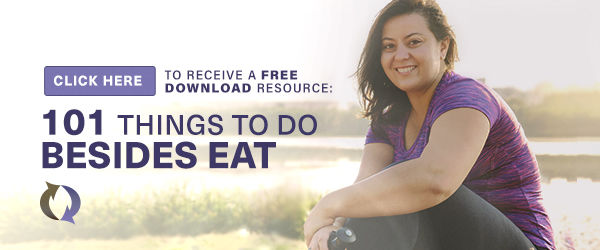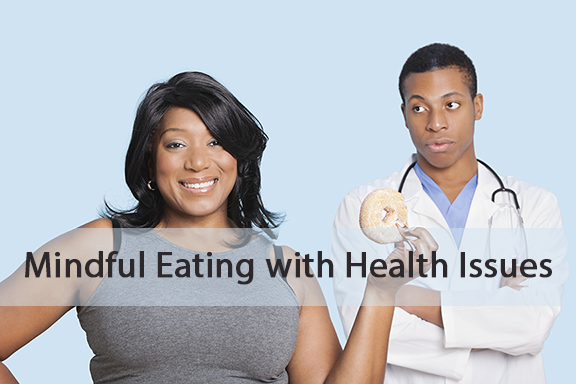Mindful eating with health issues can be a challenge to navigate. In this article, we’ll explore how to make dietary changes and eat mindfully when you have health conditions that make it seem like you can’t eat what you love.
How to Focus on Mindful Eating with Health Issues
Sometimes when people hear that my books are called Eat What You Love, Love What You Eat they ask, “But what if I can’t eat what I love because of a health condition?”
You may be afraid to eat what you love because of past problems with overeating certain foods. You are not alone!
And although it may seem counter-intuitive, the key is to learn to eat what you love fearlessly as I’ve written about extensively in my books. This article will focus on the concerns people have about mindful eating when they have medical conditions or health concerns, such as diabetes, without feeding the Restrictive Eating Cycle.
T here are many variations on “I can’t eat what I love!” such as:
here are many variations on “I can’t eat what I love!” such as:
- I have diabetes so I’m not allowed to have sugar.
- My doctor told me that I shouldn’t eat salt because I have high blood pressure.
- I am sensitive to gluten so I can’t eat bread, pasta, or some of my other favorite foods.
- I’ve had bariatric surgery so I have to follow a special diet.
Do you notice a theme in these statements above?
The real problem when it comes to mindful eating with health issues is the restrictive perspective: “not allowed, have to, shouldn’t, can’t…” Words like these can leave you feeling powerless, or even rebellious.
And those feelings can feed the eat-repent-repeat cycle.
As a result, despite your best intentions to eat mindfully with a health condition, you continue to yo-yo diet. But now, you also may have increased health risks and potentially worsening consequences—like a blood sugar that vacillates between too low and too high.
Is Mindful Eating with Health Issues Possible?
Yes! Mindful eating with health issues is possible. Ask yourself the following questions about potential dietary changes to help you eat mindfully, without restriction, even when you have health reasons for dietary limitations.
1. Is it really true that you “can’t” eat a particular food?
Many people say “I can’t” when what they mean is “I believe I shouldn’t.” It is important to acknowledge the difference between the two.
If you have a serious allergy or severe reaction to a particular ingredient, then obviously, you really can’t eat a particular food or ingredient.
If this is the case for you, remind yourself that you are choosing not to eat it because you want to feel good (or live!). When you tell yourself this, you are reminding yourself that you are making a conscious choice.
By reminding yourself that you are making a choice, you prevent yourself from feeling like a victim to your allergy or reaction.
On the other hand, if you don’t have an immediately life-threatening reaction to certain foods, completely drop words like “can’t” from your vocabulary altogether. Using words like “I’m not allowed” puts you in a restrictive, deprivation mindset rather than a self-care mindset.
2. Is it really true that you “shouldn’t” eat a particular food?
People tend to pick up rules about eating that aren’t based in fact. As a result, they keep “shoulding” themselves over myths, fads, half-truths, outdated information, or misunderstanding the facts. This is why it is essential to educate yourself on the advice you hear about what to eat.
A common example of where this applies is type 2 diabetes. Many people with diabetes believe that they “shouldn’t” eat sugar or “can’t” have carbs.
While it is true that a person with type 2 diabetes doesn’t process carbohydrate as efficiently as they once did, they can experiment with different “doses” of carbohydrate with their snacks and meals to figure out how to keep their blood sugar in the target range. (From Eat What You Love, Love What You Eat with Diabetes and the Mindful Eating with Diabetes program.)
3. Is it really true that you must completely avoid this food?
Many people who struggle with food lean toward dichotomous thinking (“black and white,” “good or bad”).
What does this mean exactly? Well, if a food isn’t particularly healthful (whatever that means and for whatever reason), it becomes labeled as a “bad” food that must be completely avoided. As a result of this same dichotomous thinking, if you eat any of that particular food, you feel like you are “bad.”
The resulting guilt often leads to more overeating—not less—and that certainly doesn’t lead to the desired benefits!
If you struggle with all-or-nothing thinking and find yourself resisting or “cheating” when you are given restrictive advice, an important question to ask your health care professional is, “Would this food (or ingredient) be harmful if I ate it in moderation?”
4. But what if certain foods worsen certain medical conditions?
If certain foods have significant health or medical consequences, it may make sense to you to limit them.
That being said, even if you feel you don’t have a choice about what you eat, you do have a choice in how you think about what you eat! In other words, you may choose to limit certain foods in order to feel good, not to be good!
An example of this is when someone has had bariatric surgery (aka weight loss surgery or WLS). Often they are given a list of guidelines to follow about when, what, and how much to eat.
These guidelines can feel like a lifelong diet—with uncomfortable or embarrassing consequences when they break the “rules.” When dietary limitations (even necessary or practical ones) feel like a diet, you are likely to struggle with the eat-repent-repeat cycle (and depending on the problems you have when you eat certain foods, the “repent” phase can be significant).
Remember: You are in charge of making choices that work for you. (From Am I Hungry? Mindful Eating for Bariatric Surgery Workbook and Awareness Journal and the Mindful Eating for Bariatric Surgery program.)
5. Is eliminating, or even limiting, this food the priority for you?
Many people think they have a problem with food when in actuality, it is a symptom! If you are struggling with food, you need to first address why you are eating.
Until you do, focusing on food is just a distraction from exploring the root cause of the problem, and therefore, won’t lead to lasting change and improved health.
You must first heal your relationship with food and build mindfulness skills to notice how certain situations, people, thoughts, emotions, and foods affect you. When you are able to do this, you will be better able to modify your eating and your diet to feel your best.
An important example of this is Binge Eating Disorder (BED). When a person is suffering BED, the priority must be on healing the eating disorder. Making changes to their diet may come later—or may even become unnecessary once BED is resolved. (From Eat What You Love, Love What You Eat for Binge Eating: A mindful eating program for healing your relationship with food and your body.)
6. Do you have to go from point A to point Z in one leap?
When people begin to focus on mindful eating with health issues and certain dietary changes are recommended or necessary, a common error they make is attempting a huge overhaul that they are unable to sustain.
Here’s a more effective approach: Ask yourself, “What is the smallest change I am confident I could make that will be (nearly) painless?”
By practicing small changes consistently, you will build on your success little by little, day by day.
7. Instead of “following a diet,” could you just “eat a diet”?
Over the last hundred years or so, the word “diet” has come to imply restriction. So, when you are “on” a diet, it is likely that you will eventually go “off” the diet.
Since the word “diet” originally referred simply to “food and drink regularly consumed,” can you reframe the way think about what you eat?
In this way, you are using the word “diet” as simply a description of your pattern of eating, instead of a program or plan you are on or you are following.
(By the way, this applies to mindful eating too! It is not a temporary program you are following; it is a way of life!)
Dietary changes for a health condition without feeding the Restrictive Eating Cycle
This article was updated from a previous version. It is the second of three articles about making dietary changes when you have health issues without feeding the Restrictive Eating Cycle.
The first article, A Diet by Any Other Name is Still a Diet, explored the idea that when people make a voluntary change in their eating in the name of “health” without mindfulness, they may find themselves hyperfocused on food with less energy left to focus on living the healthy life they set out to achieve.
The third article, 7 Am I Hungry? Mindful Eating Strategies that Help You “Eat Better”, is about using mindful eating skill to improve your nutrition without feeling restricted.
Enjoyed this article? Here are three more to help you!
A Diet by Any Other Name is Still a Diet
7 Am I Hungry? Mindful Eating Strategies that Help You “Eat Better”
Mindful Eating and Weight Loss: Setting the Record Straight


